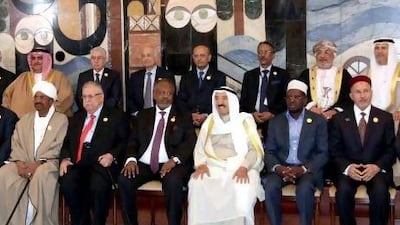BAGHDAD // Arab leaders yesterday formally endorsed the international envoy Kofi Annan's plan to end the bloodshed in Syria, and demanded that it be implemented "immediately and completely" - a sign of Arab League scepticism of the Syrian president Bashar Al Assad's commitment to the plan.
"The solution for the crisis is still in the hands of the Syrians as a government and opposition," the Arab League secretary general Nabil Elaraby told the summit gathering in the Iraqi capital, the first here in 20 years.
The six-point Annan plan calls for a ceasefire, the withdrawal of heavy weapons and troops from population centres, humanitarian assistance, release of prisoners and free movement and access for journalists.
Arab League leaders have dropped an earlier demand that Mr Al Assad give up the presidency. The Annan plan, endorsed by the United Nations Security Council, makes no such demand, unlike a previous plan that was vetoed by Russia and China.
Syria's opposition groups continue to demand that Mr Al Assad must go, and have not agreed to take part in any peace talks with his government.
The UN secretary general Ban Ki-moon also kept up the pressure on the Syrian president, and said he must turn his acceptance of the peace plan into action, to shift his country off a "dangerous trajectory" with risks for the entire region.
"It is essential that President Assad put those commitments into immediate effect. The world is waiting for commitments to be translated into action. The key here is implementation, there is no time to waste," Mr Ban told the summit.
In a draft copy of their communique, the league said: "We support the complete legitimate ambitions and demands for the Syrian people for freedom and democracy, and their right to draw their own future, and the peaceful transition to power, and curb violence, killings and bloodshed."
Fewer than half the leaders of the Arab world appeared at the summit. The only ruler from the Gulf to attend was the emir of Kuwait, Sheikh Sabah Al Ahmad Al Sabah, whose attendance was significant because Saddam Hussein invaded Kuwait in 1990 and occupied it for nearly seven months.
"We are not bothered, not concerned" as long as someone from each member country attended, said Hoshyar Zebari, Iraq's foreign minister.
The summit is the first since the Arab Spring revolts began sweeping through the region more than a year ago. The turmoil forced the cancellation of last year's summit. Since then, four perennials have been swept from the scene - Egypt's Hosni Mubarak, Yemen's Ali Abdullah Saleh, Tunisia's Zine El Abidine Ben Ali and Libya's Muammar Qaddafi.
The new leaders of Tunisia and Libya were among the 10 heads of state who attended, but Egypt and Yemen sent lower-level figures, a reflection of their own domestic turmoil.
The summit will also be remembered for an extraordinary precedent. The Iraqi president Jalal Talabani became the first non-Arab to chair an Arab League summit. Mr Talabani, a Kurd who speaks fluent Arabic and is well versed in Arab culture, has been a father figure to Iraqis since the removal of Saddam Hussein in 2003, often acting as a unifier between the nation's rival ethnic and religious factions.
Another Iraqi Kurd, Mr Zebari, chaired Wednesday's foreign ministers' meeting.
Security was tight. "An event of such importance and size deserves a special security plan and measures taken that will ensure the protection of officials, delegates and the press," said Colonel Dia Al Wakil, the spokesman for the defence ministry and the Baghdad Operations Command.
"We have taken these actions to be equipped to face any challenge or threat that could happen during the Arab League summit," he said.
Syria featured in addresses delivered by several leaders at the summit's open session, which lasted more than four hours.
The leader of Libya's National Transitional Council, Mustafa Abdul Jalil, spoke of the "scenes of torture and slaughter committed by the Syrian regime against our brothers and sisters in Syria".
Arab League chief Nabil Elaraby called on the Syrian regime to immediately implement the Annan plan and warned that the world was running out of patience with its failure to move toward a solution.
Mr Talabani said Iraq rejected violence and bloodshed in Syria and called for a peaceful solution to end the conflict there. Echoing the language in the draft communique, he said the Syrian people had a legitimate right to freedom and democracy.
Mr Al Assad said yesterday that Syria would spare no effort to ensure the success of Mr Annan's peace mission but warned it would not work without securing an end to foreign funding and arming of rebels opposing him.
in a letter to the leaders of the BRIC economic powers, which include his key ally Russia, he said "countries which support the armed groups with money and weapons must be persuaded to stop this immediately".
Britain said yesterday it was doubling non-military aid to opponents of Mr Al Assad and expanding its scope to equipment, possibly including secure telephones to help activists communicate more easily without fear of detection and attack.
The aid, worth US$800,000, "includes agreement in principle for practical non-lethal support to them inside Syria," the foreign secretary William Hague said.
* With additional reporting by Reuters, the Associated Press and Agence France-Presse

